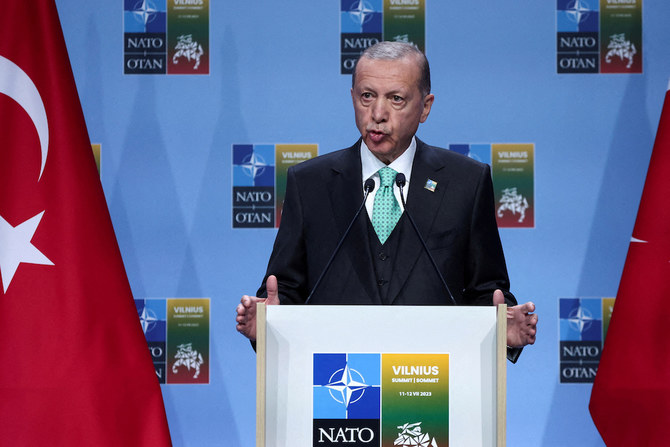
- ARAB NEWS
- 04 Jul 2025

At the NATO Summit that was held last week in Vilnius, the capital of the Baltic state of Lithuania, the agenda was dominated by the Ukraine war and Sweden’s bid to join the alliance.
Turkish President Recep Tayyip Erdogan surprised NATO by announcing before his departure for Vilnius that he was prepared to accept a trade-off on the subject of Sweden’s membership. His proposal could be summarized as follows: “You resume Turkiye’s accession process to the EU and Turkiye will open Sweden’s accession process to NATO.” Erdogan’s statement made headlines in the Turkish press and in the media of many NATO and EU countries.
However, Turkiye’s EU accession process is a separate issue. Ankara has to fulfill several political and economic criteria before joining the bloc.
In fact, an important component was missing in this trade-off. Turkiye could unblock Sweden’s accession to NATO, but the other component of the equation, the EU, was missing. It is only the European Council that can decide whether Turkiye’s EU accession process will be resumed. And just as Turkiye was entitled to block the consensus in letting Sweden join NATO, so any EU member country can block the resumption of the accession negotiations with Turkiye.
The updating of the Turkiye-EU customs union is a major headache between the two parties. Turkiye is losing money because of the postponement of the upgrade.
So far, Turkiye has not been able to stop the activities of terrorist organizations that are operating in NATO countries, such as Germany and France. Bearing this precedent in mind, Sweden may also tolerate the resumption of the activities of terrorist organizations once its accession to NATO becomes a done deal.
According to what Erdogan explained during the press conference after the summit, the procedure to be followed by Turkiye will unfold as follows: The foreign relations committee of the Turkish parliament will draft a report on Sweden’s NATO accession and incorporate it into its agenda; then, when the parliament resumes its work on Oct. 1, it will debate the report according to its work program.
In his press conference, Erdogan repeatedly mentioned: “We have a parliamentary holiday before we resume our work.” This gives the impression that Erdogan is not in a hurry to push through Turkiye’s approval of Sweden’s NATO accession. This is so that he will have plenty of time to pressure Stockholm to pass as many laws as possible to restrict the activities of the terrorist organizations operating in Sweden.
The pro-government media in Turkiye celebrated Erdogan’s performance at the NATO Summit with great fanfare, while the opposition circles claimed that the EU will again disappoint Turkiye.
Turkiye could unblock Sweden’s accession to NATO, but the other component of the equation, the EU, was missing.
Yasar Yakis
Meanwhile, the Swedish Supreme Court, one day after the NATO Summit, refused Turkiye’s request to extradite two Turkish citizens. Turkiye claims that these two men were using a mobile telephone application that is used by the followers of Fethullah Gulen, a self-exiled Turkish Muslim cleric living in the US. This app is used by the Gulen group to communicate with each other without being detected. Swedish law provides that using an app is not sufficient reason for a person to be extradited. The court added that the people in question had acquired immigrant status in Sweden and stated that, if they were extradited to Turkiye, they may be tortured. This attitude of the Swedish Supreme Court suggests that mutual recriminations will continue between the two countries for a long time.
The extradition of alleged members of Gulen’s clan has been one of the key issues regarding Turkiye’s approval of Sweden’s NATO accession. So the refusal of the Swedish court in this case was the first test on this subject. The final decision on similar cases is made by the Swedish government but, as an established practice, it does not make decisions based on the request of a foreign government.
During the summit, Erdogan met with the leaders of several NATO countries, including the US, Germany, the UK, France, Spain, Greece and the Netherlands. In his talks with US President Joe Biden, the pair exchanged views about the sale of F-16 fighter jets to Turkiye and the upgrading of parts of its existing fleet. The US president put the ball in Congress’ court and promised that he would do his best to persuade some leading lawmakers to give their approval.
Meanwhile, promising progress has been achieved in the Turkish-Greek dialogue. As has happened on previous occasions, earthquakes in the region have brought the neighboring countries together. This time, Erdogan and Greek Prime Minister Kyriakos Mitsotakis decided to resume discussions and hold a meeting in Thessaloniki in the autumn. The fact that both Erdogan and the Greek prime minister are at the beginning of their respective mandates suggests that, if their wavelengths match, concrete progress may be achieved. Even if the core issues cannot be addressed at an early date, they may begin by cooperating to solve some less controversial issues. Erdogan believes that the two countries have immense opportunities to cooperate.
The Greek media adopted an appeasing tone with Turkiye after the Vilnius summit. The foreign ministers of the two countries will probably play major roles. Erdogan will visit Greece for the first time in six years and will also co-chair the Turkiye-Greece High-Level Cooperation Council. Another possibility for the two leaders to meet will be in New York on the margins of the UN General Assembly in September. This warmer atmosphere may also allow the resumption of confidence-building measures in the Aegean Sea after an interval of more than three years.
There are signs of a sea change between Turkiye and Greece and between Turkiye and NATO. Let us hope that the atmosphere created by the Vilnius summit will further facilitate this more cordial atmosphere.